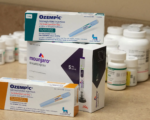Lilly’s Breakthrough in Cholesterol Treatment
Eli Lilly’s experimental oral medication, muvalaplin, has shown significant promise in treating an inherited form of high cholesterol, specifically targeting lipoprotein(a), or Lp(a). Data from a mid-stage trial, presented at the American Heart Association meeting in Chicago, revealed that the highest dose of muvalaplin reduced Lp(a) levels by 70% using traditional tests and nearly 86% with a more specialized testing method.
Lp(a) is a major risk factor for cardiovascular diseases such as heart attacks and strokes, affecting approximately one in five people globally. Unlike LDL cholesterol, which can be managed with statins, Lp(a) currently has no approved treatments, and many people are unaware they have elevated levels.
Study Details and Results
The trial involved 233 adults with high Lp(a) levels, comparing three daily doses of muvalaplin (10 mg, 60 mg, and 240 mg) with a placebo. Using a traditional blood test, the drug reduced Lp(a) by 40.4%, 70.0%, and 68.9% for each dose, respectively. With the more precise test, reductions were 47.6%, 81.7%, and 85.8%.
Future Prospects and Safety
While muvalaplin showed significant efficacy in reducing Lp(a), adverse events in the treatment and placebo groups were similar, suggesting a favorable safety profile. Ruth Gimeno, Lilly’s VP for diabetes and metabolic research, expressed excitement about advancing the drug to late-stage trials. However, large-scale studies are still required to confirm if lowering Lp(a) can directly reduce cardiovascular events such as heart attacks.
Competitors in the Field
Lilly faces competition from other companies developing Lp(a) treatments, such as Silence Therapeutics, which reported successful results from its injectable drug zerlasiran. Zerlasiran, delivered every 16 to 24 weeks, reduced Lp(a) by up to 85%. Other injectable options in development include drugs from Amgen and Novartis.


















